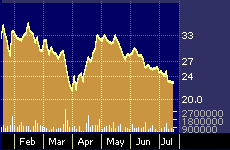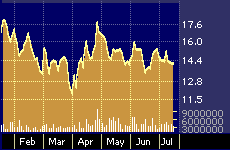
Long-Term Trends Favor Foundries
Long-Term Trends Favor Foundries
By Hal Plotkin
Silicon Valley Correspondent
Analysts say strong fundamentals and the flight to quality will continue to work in favor of foundry stocks such as Taiwan Semiconductor Manufacturing Co. {TSM} and Chartered Semiconductor Manufacturing Ltd. {CHRT} for the foreseeable future.
“These are real core holdings you’ll want to own for the next five years,” says Lucas Ward, an analyst with Chase H&Q in New York. “New diversified applications of semiconductors are creating a huge and growing demand for foundries, which have a low-risk, high-growth business model.”
Foundries provide outsourced semiconductor-manufacturing services used by companies in the computer, electronics and communications markets.
Like much of the domestic equity markets, the two leading foundry stocks traded in the United States, Taiwan Semiconductor and Chartered Semiconductor, have been on a bit of a roller-coaster ride in recent weeks.

Post-IPO chart for CHRT

Post-IPO chart for TSM
The stocks, particularly Chartered Semiconductor, were hurt in mid-April by worries over the impact of the company’s plan to bring 78 million additional shares to market. That would have been on top of 135 million shares from existing shareholders that were also coming to market at about the same time, putting the overall size of the new stock placement at about $1.7 billion. Investors worried about an oversupply sold off stocks in the sector.
On April 16, however, Chartered Semiconductor, which went public late last year with shares priced at $20, postponed the planned secondary offering, citing market conditions.
Investors promptly stepped in and bought both stocks on their recent dips.
Drew Peck, an analyst at S.G. Cowen Securities in Boston, says it was and remains a smart thing to do.
“The more glamorous side of the communications sector tends to attract the fast money,” Peck says. “But in the final analysis, the companies generating real earnings are much more attractive. As the bubble continues to burst, money is going to be spread out to more stable companies. The foundries are certainly in that category.”
Analysts say the outlook for the foundry sector has never been more promising.
Overall sales by foundries are projected to increase from less than $7 billion last year to more than $36 billion by 2004, according to a recent report by International Data Corp. of Framingham, Mass.
“The surge in strategic outsourcing by integrated-circuit manufacturers is being felt by all major dedicated foundries and will underpin high growth in the merchant-foundry business,” says Mario Morales, director of semiconductor research at IDC. “In fact, the rate of value gain is so rapid that foundries seem bound to continue to gain share well into the new century.”
“By the end of this year, business is really going to be rolling,” agrees Bill McClean, president of IC Insights Inc., an integrated-circuit industry market-research firm based in Scottsdale, Ariz. “There is a very solid chance this year is going to be a fantastic year.”
Foundries are benefiting from several factors, in addition to skyrocketing demand for virtually all types of the integrated circuits they produce. Customers, for example, get access to the most modern chip-making processes without having to invest billions to build and maintain their own facilities. Foundries, on the other hand, get a diverse group of customers who keep their factories humming around the clock while immunizing them against downturns in any one particular market segment.
“Outsourcing is a trend that’s here to say,” Ward says.
Just 12 percent of semiconductor manufacturing is outsourced, compared with more than 50 percent of other manufactured goods. Analysts say the foundries will grab more and more market share in the months and years ahead.
“The value foundries add through outsourcing is much higher than added by other contract manufacturers,” Ward says. “And the barriers to entry are just enormous. That means the leaders will be able to consolidate their position in a market that has a lot of room to grow.”
The only disagreement among the analysts is over which of the two stocks looks most attractive right now.
Ward gives the edge to Taiwan Semiconductor.
“Taiwan Semiconductor is supreme compared to anyone else in that market,” Ward says. “They have the strongest brand, the most skill, the best technology, are growing the fastest and are by far the largest. They’re in a class by themselves.”
Ward has a “buy” rating on both stocks. He doesn’t have formal price targets on either, but he says he expects Taiwan Semiconductor will hit new highs over the next six months, which would push the stock, now trading at about 50, above 72.
But Ward also says Chartered Semiconductor remains a very attractive play, as well.
“Both stocks have tremendous long-term potential,” Ward adds. “I believe both companies will be larger than Intel {INTC} sometime this decade.”
Peck also likes both stocks but says Chartered Semiconductor is the better buy at the moment.
Peck says Chartered Semiconductor’s location in Singapore puts it beyond the reach of the political and geographical fault lines that could have an adverse impact on its Taiwan-based rival. There are always worries, he notes, that Taiwan’s active seismic zone may start moving again and cause more earthquakes unpredictable levels of losses. In addition, the unsettled political status of the island nation also could destabilize Taiwan Semiconductor’s otherwise rock-solid business prospects.
“I see nothing wrong with a strategy of investing in both of them,” Peck says. “But Chartered may have the lower risk.”
In addition, Peck says Chartered Semiconductor has the opportunity to increase earnings more quickly than Taiwan Semiconductor, because the company is still in catch-up mode as compared with its larger rival.
“It’s looking pretty good for both companies,” McClean says. “We’re looking at very strong demand and average selling prices that increased quite nicely last quarter. Everybody is going to make money.”
On April 25, Taiwan Semiconductor reported first-quarter earnings of $330 million, representing a 146.7 percent increase over the same period last year. The results were in line with analyst expectations.
On April 19, Chartered Semiconductor posted fiscal year 2000 first-quarter net income of $37.8 million, as compared with a loss of $34.9 million for the same period a year earlier, during which time the company made substantial investments to expand manufacturing capacity.


